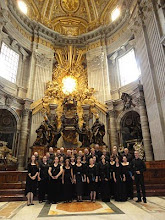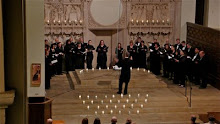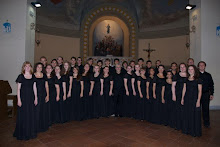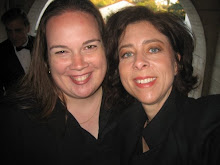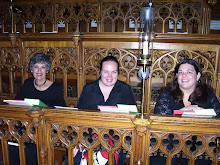This morning was my first rehearsal in the loft with the Mormon Tabernacle Choir! Let me back up a little. The Mormon Tabernacle Choir has some "Special Projects" coming up. They told the Chorale they had some room for some of us and priority would be given to those that could make it to all three, (along with the required rehearsals). Well, of course, I signed up for all three and I found out Friday they had room for me! Woohoo!
So this morning, after watching Music and the Spoken Word, I made my way to the back row of the second alto section. Another first was singing with Mack Wilberg conducting. (We've been working with Ryan Murphy in the Chorale.)
It wasn't a weird as I thought it was going to be. Sitting with the choir felt like coming home again. And sight-reading through the pieces is a familiar practice and one I've missed the last few years. Sitting in the back row, in the women's section, it was a little hard to hear the tenors who are up against the organ on the other side from us. That will take some getting used to. And of course being in the back row I'm not getting any help from any veteran second altos behind me. :)
Sunday, January 26, 2014
Friday, January 3, 2014
The Audition
This is my second time typing this post. The first time, after publishing it, I went to correct some typos from my tablet and ended up reverting to an older version I had done on my tablet. Lesson learned. Here we go again.
B. Complete the application. (This was the easiest of the three initial parts.)
C. Bishop's Confidential Recommendation
My bishop was asked to make sure I met the following requirements.
We were ushered downstairs where we were to sing for the Music Director, Mack Wilberg, Associate Music Director, Ryan T. Murphy, and our accompanist. We were allowed to prepare any hymn we wanted. I chose Love One Another. (It just felt right.)
I was extremely nervous. The only other time I get that nervous is singing solo in church. I was less nervous after I started the hymn. We were also asked to perform vocal exercises showing our flexibility, timbre, rhythm, musical memory, tonal consistency, and range. Even though I put Alto I on my application, I could tell they liked that I had a lower range as well. Mack Wilberg asked if I've sung second alto. I told him I usually sing whatever the director needs. (Brownie points?) The truth is second alto is like Home Sweet Home! Even though all my voice teachers were convinced I'm a soprano (dramatic soprano). We were also expected to sight-read. Usually in sight-reading exams you have a few moments to look over the example first. This was not the case. Mr. Wilberg said, "look at number 8. Here's your starting pitch. Ready and..." SING! Just about enough time to determine if I was starting on the tonic or not. I know I missed some but I was able to correct them on the next pass. And at least I nailed the tri-tone! Woohoo!
I didn't know what to expect. I knew I had sung a little shaky, thanks to the nerves, and I know I didn't ace the sight-reading. I didn't know what they were looking for or where I fell in the spectrum. I knew I had to prepare myself for the possibility that I was not accepted into the choir. I knew I had to remove all pride from the equation (which is hard to do for performers.) I knew that whatever happened I would be stronger for the experience and had a new respect for the level of musicianship the choir members employ.
November 22, 2013 I received my admittance letter into the choir. It still doesn't feel real. I can't believe I get to be a part of such an amazing organization. An organization that has been around since 1847! 1847!!! I felt prompted to share the entire experience on Facebook and posted my acceptance letter. I thought my family and a few close friends might click "like" or comment but I was floored and humbled by the outpouring of love and support. I had never experienced anything like it! I truly feel my Savior's love.
The Audition
**This was easily the hardest audition I ever went through. It was easier getting in to grad school! I want to outline the requirements and add my experiences with the process as well.
May 2013 the audition materials became available online, outlining the three phases of the audition.
Phase I: Application and Recorded Audition
A. The Recording
1. Select one of three hymns
1. Select one of three hymns
- Abide with Me
- O My Father
- I Need Thee Every Hour (I chose this one.)
- Sing one verse, without accompaniment, in your natural singing style. Play and announce beginning and ending pitches.
- Sing the first few measures of the song with a straight tone. (No vibrato.)
- Sing the first few measures of the song sotto voce. (Quietly.)
- Sing the first few measures of the song fortissimo. (Loudly)
B. Complete the application. (This was the easiest of the three initial parts.)
C. Bishop's Confidential Recommendation
My bishop was asked to make sure I met the following requirements.
- Is a member in good standing and qualify for a temple recommend.
-Is an active member of her ward.
-Has no conflict between family responsibilities and choir membership.
-Is a worthy representative of the Church in all personal actions.
-Can otherwise accept what the First Presidency considers a missionary calling.
- Is between 25 and 55 years of age.
- Resides within 100 miles of Temple Square.
- Is in adequate health.
- Able to commit to maintaining the required levels of attendance while being able to take care of family and work responsibilities.
**Even though I had a couple months to turn the CD in, I found myself coming up with reasons to put the recording off. I could always practice more, be in better vocal health etc. I eventually sat down, finished the recording and mailed it in on August 14th, 2013. The directors received just short of 250 recordings.
September 17, 2013 I received a letter stating I was invited to take part in the next phase.
Phase II: Musical Skills Assessment Saturday Oct. 12, 2013
Preparation for the assessment included a text we had the option of borrowing from the music library. (I made sure to get a copy since I've seen different terminology and even explanations for the same theory.) That text became my best friend over the next month. I made sure to memorize all the terms and practiced all the concepts.
"The Musical Skills assessment is designed to measure your aptitude in music theory and related concepts which are essential to choral singing."
We were tested on
We were tested on
- Notation of Pitch
- Time Division
- Time Signatures
- Intervals
- Basic Scales
- Major Scales
- Minor Scales
- Key Signatures
- Triads
- Music Fundamentals (written)
- Tonal Memory (aural): Listen to a solid chord and arpeggiated chord. Decide if the first, second, third, or fourth note of the arpeggiated chord changed from the notes in the solid chord.
- Melody Recognition (aural): Listen to a melody played alone, then harmonized. In the harmonized version, decide if the melody is in the highest, middle, or lowest part.
- Pitch recognition (aural): Listen to the key tone (tonic, root) and determine the pitch of the second note. Decide if the first, second, third, or none of the pitches following the key tone is the pitch shown.
- Major-Minor Mode Discrimination (aural): Listen to the two chords in question and decide if they are major or minor. (Some of the chords are inverted making it a little more difficult.) Then, listen to a phrase and decide if it is major or minor or changes mode.
- Feeling for Tonal Center (key tone, key center) (aural): Listen to 4 chords of the key. Then listen to three tones and identify the key tone. Then, listen to a phrase. Decide which of the notes is the key tone.
- Auditory-Visual Discrimination (aural and visual): Listen to 4 measures. Identify which measures are played differently in pitch from the notation. Then, listen to 4 measures. Identify which measures are played differently in rhythm from the notation.
- Musical Aptitude (aural): Short musical statements (like 8 measures!) It is played a second time and you have to identify whether the second time varied rhythmically, tonally, both, or not at all. (This was the hardest section for me. The example was random and long and the difference could be a single note.)
I left the exam not exactly confident which is pretty unsettling.
October 29, 2013 I received word that I had passed at least 80% of the assessment. They sent our score sheet along with the letter. I was pleased that I was "strong" in most areas and only "weak" in one. (I know it's the section I talked about above.) I was now invited to participate in the next phase.
Phase III: In-Person Vocal Audition November 5, 2013
**That's right. Just one week after receiving the letter.
The night of the live audition we filled out some paperwork and met for a brief interview with the choir president. The only thing he asked me was why audition for the Choir now?We were ushered downstairs where we were to sing for the Music Director, Mack Wilberg, Associate Music Director, Ryan T. Murphy, and our accompanist. We were allowed to prepare any hymn we wanted. I chose Love One Another. (It just felt right.)
I was extremely nervous. The only other time I get that nervous is singing solo in church. I was less nervous after I started the hymn. We were also asked to perform vocal exercises showing our flexibility, timbre, rhythm, musical memory, tonal consistency, and range. Even though I put Alto I on my application, I could tell they liked that I had a lower range as well. Mack Wilberg asked if I've sung second alto. I told him I usually sing whatever the director needs. (Brownie points?) The truth is second alto is like Home Sweet Home! Even though all my voice teachers were convinced I'm a soprano (dramatic soprano). We were also expected to sight-read. Usually in sight-reading exams you have a few moments to look over the example first. This was not the case. Mr. Wilberg said, "look at number 8. Here's your starting pitch. Ready and..." SING! Just about enough time to determine if I was starting on the tonic or not. I know I missed some but I was able to correct them on the next pass. And at least I nailed the tri-tone! Woohoo!
I didn't know what to expect. I knew I had sung a little shaky, thanks to the nerves, and I know I didn't ace the sight-reading. I didn't know what they were looking for or where I fell in the spectrum. I knew I had to prepare myself for the possibility that I was not accepted into the choir. I knew I had to remove all pride from the equation (which is hard to do for performers.) I knew that whatever happened I would be stronger for the experience and had a new respect for the level of musicianship the choir members employ.
November 22, 2013 I received my admittance letter into the choir. It still doesn't feel real. I can't believe I get to be a part of such an amazing organization. An organization that has been around since 1847! 1847!!! I felt prompted to share the entire experience on Facebook and posted my acceptance letter. I thought my family and a few close friends might click "like" or comment but I was floored and humbled by the outpouring of love and support. I had never experienced anything like it! I truly feel my Savior's love.
Thursday, January 2, 2014
Orientation/Choir School Day One
I was so excited to start our Choir School and Temple Square Chorale experience tonight with orientation. After Thanksgiving we were directed to pick up our security badge and parking passes. I went to the Church Administration building and had my picture taken for my id badge and was given my parking sticker and placard to park in the Church lots. Very exciting!
Tonight, they took our picture for the directory, we received official name tags and were given a binder for our Choir School notes. They introduced the staff and we got to tour the underground under the tabernacle. (We had seen some of the rooms already during the audition process.) The highlight of the tour for me was getting to see the sister's dressing room. There hanging in each choir members spot were the infamous choir dresses. As much as we joke about those dresses, I felt the spirit, very strongly, seeing them hanging there and meeting the woman who, up until 2 years ago, hand made each dress herself. We also walked through the musical library (housing over one million pieces of music) and received our music locker. There is a team of volunteers who work in the music library to make sure all 360+ members have the music they need for each weekly broadcast.
Tonight's topic in Choir School was Alignment. Seems like a basic topic but fundamental in surviving as a singer. You can expect your instrument to operate correctly if you're slouched over with poor posture. She gave us some stretches to strengthen the muscles most commonly fatigued once you begin using good posture. We also got to sing a little bit. Singing Angels We Have Heard On High she had everyone sing it slouched over then in the middle of the phrase stand upright with correct alignment. The difference was immediate and obvious.
Tonight, they took our picture for the directory, we received official name tags and were given a binder for our Choir School notes. They introduced the staff and we got to tour the underground under the tabernacle. (We had seen some of the rooms already during the audition process.) The highlight of the tour for me was getting to see the sister's dressing room. There hanging in each choir members spot were the infamous choir dresses. As much as we joke about those dresses, I felt the spirit, very strongly, seeing them hanging there and meeting the woman who, up until 2 years ago, hand made each dress herself. We also walked through the musical library (housing over one million pieces of music) and received our music locker. There is a team of volunteers who work in the music library to make sure all 360+ members have the music they need for each weekly broadcast.
Tonight's topic in Choir School was Alignment. Seems like a basic topic but fundamental in surviving as a singer. You can expect your instrument to operate correctly if you're slouched over with poor posture. She gave us some stretches to strengthen the muscles most commonly fatigued once you begin using good posture. We also got to sing a little bit. Singing Angels We Have Heard On High she had everyone sing it slouched over then in the middle of the phrase stand upright with correct alignment. The difference was immediate and obvious.
Vocal Assessment
After the extensive audition, they called us in to meet with the voice coach for a vocal assessment and to determine which section we would sing in while in the Temple Square Chorale. I was getting over my cold but it was no surprise that the fact I can sing F3 guarantees my spot in the second alto section. It kind of cracks me up since every voice teacher I ever had says I'm a soprano then I get in choirs and it's second alto land.
She also checked the following
She also checked the following
- Overall Posture
- Head/Backbone Alignment
- Jaw Alignment
- Jaw Tension
- Chest Position
- Inspiration
- Expiration
- Vibrato
- Vibrato Rate
- Size of Tone
- Color/Resonance
- Onset
- Vowel Height
- Larynx Position
- Tongue Position
- Vowel/Lip Formation
- Lip Position
- Tongue Tension
- Facial Position
- Facial Expression
- Staccato Motion
- Marcato Motion
- Straight Tone
- Vowel Alteration
- and Messa di Voce
Subscribe to:
Comments (Atom)



.jpg)






